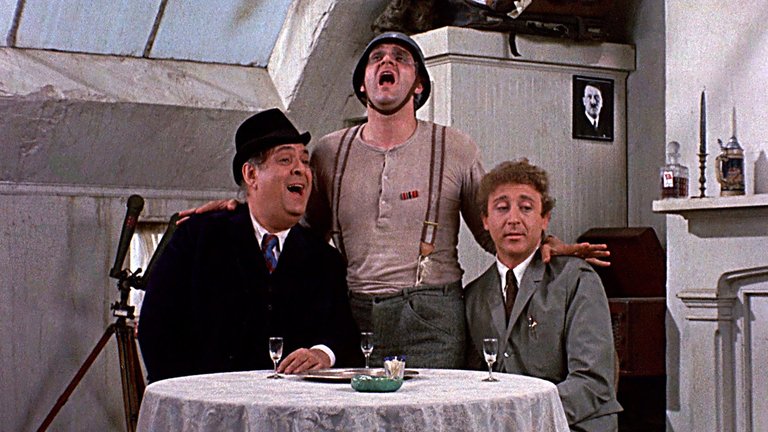
There exists a peculiar category of films so egregiously bad that one questions whether their ineptitude is accidental or a calculated ruse. This concept, later popularised by Uwe Boll’s infamously maligned filmography, finds its comedic zenith in Mel Brooks’ 1967 directorial debut, The Producers. The film’s premise—a duo conspiring to stage a deliberate flop to defraud investors—mirrors the very meta-narrative of a ‘so-bad-it’s-good’ production, albeit with Brooks’ signature wit. Released to initially tepid box-office returns, the film defied expectations to become a sleeper hit, earning cult status and launching Brooks’ career as a cornerstone of 1970s Hollywood comedy. Its audacious satire, centred on a musical glorifying Hitler, remains a masterclass in subversive humour, proving that even the most taboo subjects can be disarmed through ridicule.
Brooks’ script draws heavily from his firsthand experiences in mid-20th-century Broadway, particularly his acquaintance with Benjamin Kutcher, a producer notorious for funding plays through unconventional means—including romancing elderly benefactors. This seedy underbelly of theatre financing is embodied in Max Bialystock (played by Zero Mostel), a once-celebrated producer reduced to seducing octogenarians for cheques.
The plot starts as Bialystock, teetering on bankruptcy, encounters Leo Bloom (played by Gene Wilder), a neurotic accountant who stumbles upon a loophole: overselling shares in a guaranteed flop to embezzle the surplus. Their quest for the “worst play ever written” leads them to Springtime for Hitler, a deranged ode to the Führer penned by unrepentant Nazi Friedrich Liebkind (played by Kenneth Mars). To ensure failure, they enlist Roger De Bris (played by Christopher Hewett), a flamboyantly incompetent director, and cast Lorenzo St. Dubois (played by Dick Shawn), a drug-addled hippie, as Hitler. The irony? The play’s premiere is misinterpreted as satire, becoming a smash hit—a twist that devastates the schemers, who’d promised investors 25,000% returns.
Brooks began drafting the script in 1961 under the working title Springtime for Hitler, a provocation that repelled studios wary of lampooning Nazism so soon after the Holocaust. Undeterred, Brooks—a Jewish World War II veteran who faced anti-Semitism while serving and took part in the Battle of the Bulge—saw mockery as the ultimate rebuttal to tyranny. “Ridicule is the only weapon which can be used against unintelligible ideas,” he later asserted, framing the film as both a personal catharsis and a cultural antidote to fascism’s lingering spectre. Producer Sidney Glazier’s gamble on Brooks’ vision, despite industry scepticism, underscores the film’s defiance of artistic timidity.
Brooks’ transition from television writer to filmmaker was fraught with challenges. His inexperience behind the camera manifested in technical limitations—stiff framing, uneven audio syncing—that critics like Pauline Kael derided as “amateurishly crude”. Compounding these hurdles was his fraught dynamic with Zero Mostel, whose larger-than-life persona clashed with Brooks’ meticulous direction. Mostel, a seasoned theatre actor, favoured broad, physical comedy, while Brooks sought a balance between slapstick and subtlety. Yet, these tensions inadvertently enriched the film’s chaotic energy, mirroring the absurdity of its plot.
Despite production woes, Brooks’ razor-sharp script and deft handling of tone ensured the film’s coherence. Clocking in at a lean 88 minutes, The Producers sustains its madcap pace through tightly written scenes and punchline-driven dialogue. Brooks’ layered farce critiques both artistic pretension and audience gullibility, with the protagonists’ downfall serving as a darkly comic morality tale. The ensemble cast elevates the material: Mostel’s bombastic greed contrasts Wilder’s twitchy vulnerability, while Dick Shawn’s LSD-inspired Hitler—a parody of counterculture naiveté—steals every scene. Brooks’ background in sketch comedy (notably Sid Caesar’s Your Show of Shows) shines in set pieces like the “Springtime for Hitler” musical number, a grotesque yet hilarious spectacle that remains the film’s pièce de résistance.
Mostel’s theatricality—epitomised by his comb-over and thunderous delivery—initially jars modern sensibilities accustomed to naturalism. Yet, as the film progresses, his chemistry with Wilder (in only his second film role) becomes its emotional core. Wilder’s Leo, oscillating between panic and reluctant mischief, laid the groundwork for his later collaborations with Brooks, notably Young Frankenstein. Kenneth Mars’ Liebkind, though bordering on caricature, captures the absurdity of unrepentant bigotry, his pigeon-coop tirades serving as both comedy and caution.
More sensitive parts of contemporary audiences may bristle at the film’s unapologetic stereotypes. Roger De Bris’ flamboyant homosexuality and Ulla (Lee Meredith), the Swedish secretary whose “work” entails dancing in lingerie, reflect a time when such tropes were deemed acceptable comedic fodder. While Brooks intended these portrayals as farcical exaggerations, they risk alienating viewers attuned to “political correctness” in today’s comedies. Yet, to dismiss the film outright for these elements is to overlook its broader satire, which targets hypocrisy and greed rather than marginalised groups.
John Morris’ score amplifies the absurdity, particularly in the titular Springtime for Hitler, a garish parade of Nazi iconography undercut by campy choreography. Dick Shawn’s rendition of “Love Power”—a send-up of 1960s hippie idealism—epitomises the film’s ability to skewer societal trends while delivering laugh-out-loud moments. Though overshadowed by the main musical number, it underscores Brooks’ knack for blending sharp satire with infectious melodies.
Initially dismissed by critics as tasteless, The Producers gradually garnered acclaim, culminating in an Oscar for Best Original Screenplay. Its influence reverberated through Brooks’ subsequent works (Blazing Saddles, Young Frankenstein) and inspired a 2001 Broadway adaptation that won a record 12 Tony Awards. However, the 2005 film version, directed by Susan Stroman, failed to recapture the anarchic spirit of the original, underscoring the irreplicable alchemy of Brooks’ vision.
The Producers is a film about failure that succeeded beyond expectations, a satire that offends even as it disarms. Its technical flaws and dated sensibilities are undeniable, yet they pale against its audacity and comedic brilliance. In an era where ‘offense’ often eclipses intent, Brooks’ masterpiece reminds us that laughter—even at the grotesque—can be an act of defiance. As Max Bialystock himself might declare: “That’s our Hitler! That’s our Hitler!”.
RATING: 8/10 (+++)
Blog in Croatian https://draxblog.com
Blog in English https://draxreview.wordpress.com/
InLeo blog https://inleo.io/@drax.leo
Hiveonboard: https://hiveonboard.com?ref=drax
InLeo: https://inleo.io/signup?referral=drax.leo
Rising Star game: https://www.risingstargame.com?referrer=drax
1Inch: https://1inch.exchange/#/r/0x83823d8CCB74F828148258BB4457642124b1328e
BTC donations: 1EWxiMiP6iiG9rger3NuUSd6HByaxQWafG
ETH donations: 0xB305F144323b99e6f8b1d66f5D7DE78B498C32A7
BCH donations: qpvxw0jax79lhmvlgcldkzpqanf03r9cjv8y6gtmk9
Posted Using INLEO
